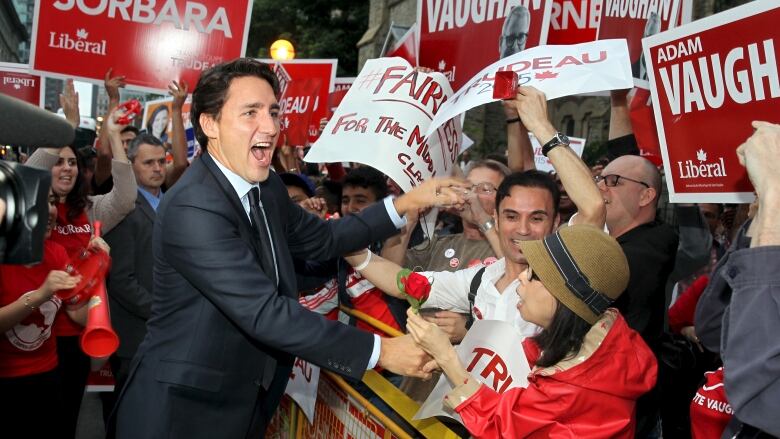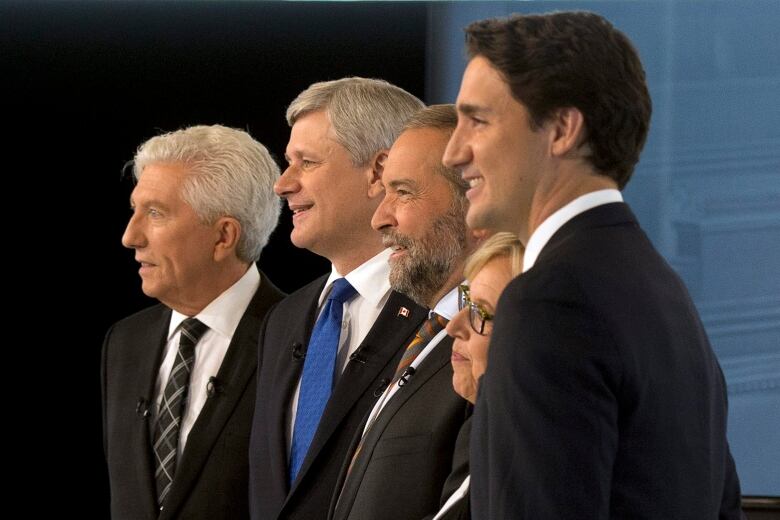Poll Tracker: Liberals poised for win barring Conservative surprise
Long and winding campaign has turned a three-way race into a contest with a clear leader

After 78 days, it all comes down to tomorrow. And the polls, at least, suggest that the day will go to the Liberals, installingJustin Trudeau as Canada's next prime minister.
Up to and including thosepublished by early Sunday morning, the Liberals haveled in 17 consecutive polls, including surveys conducted by eight different polling firms using an array of methodologies.
- Poll Tracker:Follow the latest numbers
- Podcast: Listen to ric Grenier's Election Pollcast
- How to watch: CBC News coverage on Monday
- Election night: Follow CBC's live results page
The polls of all but one of those firms put the gap between the Liberals and the Conservatives outside the margin of error. And every pollhas the New Democrats in third, trailing the Conservatives by between seven and 12 points and the Liberals by between 12 and 17 points.
The CBC Poll Tracker, which will be updated throughout the day Sunday as new polls are published, has awarded the Liberals a lead in the polling averageand in the average seat projectionsince Oct. 7. The Liberals' likely high range of seats has also outpaced the Conservatives' high range for the last week, as Trudeau's party moved ahead in Ontario and subdued the advantage the Tories had in vote efficiency.
The gap that exists between the Liberals and Conservatives in the Poll Tracker is not wideenough to give the Liberals a high probability of reaching the 170-seat mark required for a majority government. It is also not wide enough to rule out the possibility the Conservatives could eke out more seats than the Liberals nationwide.
So, though the Liberals are favoured in the polls today, it still makes the outcome of tomorrow's election uncertain.
Nevertheless, the party holds almost every advantage in the polls. The Liberals have the momentum, having picked up an average of two points per week over the last three weeks. The Conservatives, meanwhile, have seen no discernible trend, negative or positive, over thattime. Justin Trudeau is more highly rated than Stephen Harper on who would make the best prime minister, and Trudeau's approval ratings are far superior to those of Harper. Even on ballot box issues such as the economy, polls suggest Trudeau is at least on even terms with the Conservative leader.
Though momentum could carry them there, amajority governmentseems to be out of reach for the Liberals. While the party has made impressive inroads among francophones in Quebec, it may not be enough to deliver the seats they need to get over the majority threshold. But depending on how effective the Liberals are at getting their vote out in Ontario, and whether or not they win most or all of the swing ridings up for grabs, the party could be knocking on the door of a majority government before the night is over.
'Shy,'voting Tories
There are a few factors that could contribute to a surprisingly good performance by the Conservatives on Monday night, making even a Liberal minority government unattainable for Trudeau.
Two of these factorscannot yet be measured. The first is the potential for "shy Tories," a phenomenon first noticed in the United Kingdom in the 1990s and which revealed itself again in David Cameron's unexpected majority victory in the country's May election. "Shy Tories"are Conservatives unwilling to disclose their voting intentions to pollsters for any number of reasons, including social desirability bias (people saying what they think others want to hear).

The second factor is organization and resources. The Liberals and New Democrats have their own well-oiled machines, but those machines are not as well-funded as that of the Conservatives. However, the experience of the Bloc Qubcois in 2011 demonstrated the limits of superiororganization and fuller coffers.
One factor that can be measured is the Conservatives' traditional demographic advantage. Elections Canada estimated that more than70 per cent of voters over the age of 55 cast a ballot in the 2011 election, while less than halfof voters under the age of 35did so.
Over the past few elections, the Conservatives have had higher support among older Canadians than other parties. But it is not clear that this is still the case. Recent polls by EKOS Research and the Angus Reid Institute show substantial leads for the Tories among older Canadians (from five to six points), but polls by Nanos Research, Forum Research, and Mainstreet Research show the Liberals edging out the Tories among the oldest cohort of Canadians by just as wide of a margin.
A long and winding road
When this campaign began, the Liberals were in third place and sinking in the polls. Their chances of ultimately winning appeared slim.

But an opening debate in which Trudeauwas seen to have performed wellgot the Liberals back into the race, though the New Democrats still held the lead they had consistently enjoyed since the spring. The Duffy trial put a dent in the Conservatives' numbersas the party fell into third place, only to see their fortunes buoyed once again by decent economic and fiscal news and a harder stance on the unfolding refugee crisis that might not have been onside with public opinion but was the right position for their own support base.
The campaign then became averitable three-way race, as the mainparties found themselves within the margin of error of each other in poll after poll. But the eruption of the niqab debate in Quebec broke the stalemate. The New Democrats were already losing a bit of steam in the province, but the issue cut the legs out from under the NDP's campaign in the province, boosting both the Conservatives and Bloc Qubcois.
The NDP's hit in Quebec dropped the party out of the national three-way race, which mayhave begun a bleeding of Liberal-NDP swing voters towards the Liberals, as these votersbacked the party that was emerging as the one more likely to defeat the Conservatives. Thatboosted the Liberals further, aided by a leader who was surpassing the low expectations his opponents had set for him on the campaign trail.
The polls are now suggesting that at the end of this path lies a Liberal victory. Voters will have the final say tomorrow.
CBC's Poll Trackeraggregates all publicly released polls, weighing them by sample size, dateand the polling firm's accuracy record. Upper and lower ranges are based on how polls have performed in other recent elections. The seat projection model makes individual projections for all ridings in the country, based on regional shifts in support since the 2011 election and taking into account other factors such as incumbency. The projections are subject to the margins of error of the opinion polls included in the model, as well as the unpredictable nature of politics at the riding level. The polls included in the model vary in size, dateand method, and have not been individually verified by the CBC.You can read the full methodology here.













_(720p).jpg)


 OFFICIAL HD MUSIC VIDEO.jpg)
.jpg)



























































































